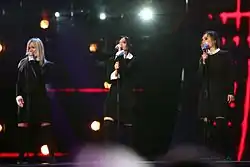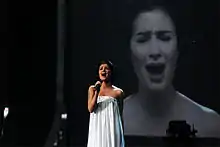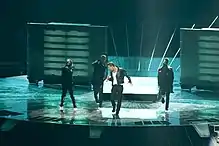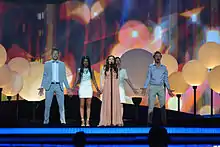Russia in the Eurovision Song Contest
Russia has participated in the Eurovision Song Contest 22 times since their debut in 1994. Russia won the 2008 contest with Dima Bilan performing the song "Believe". One of the most successful countries in the contest in the 21st century with a total of ten top five placements, Russia finished second with Alsou in 2000, Dima Bilan in 2006, Buranovskiye Babushki in 2012 and Polina Gagarina in 2015; third with t.A.T.u. in 2003, Serebro in 2007, Sergey Lazarev in 2016 and 2019, and fifth with Dina Garipova in 2013. In 2018, they failed to qualify for the final for the first time in their history.
| Russia | |
|---|---|

| |
| Member station | |
| National selection events | National final
Internal selection
|
| Participation summary | |
| Appearances | 22 (21 finals) |
| First appearance | 1994 |
| Best result | 1st: 2008 |
| External links | |
| Channel One page Russia-1 page | |
| Russia's page at Eurovision.tv | |
Russia in the Eurovision Song Contest 2021 | |
Contest history
Their debut was in the 1994 contest after Russia became a member of the European Broadcasting Union (EBU). Russia came second at four contests; in 2000 with the song "Solo" performed by Alsou, in 2006 with Dima Bilan's song "Never Let You Go", in 2012 with the song "Party for Everybody" performed by Buranovskiye Babushki, and in 2015 with Polina Gagarina's song "A Million Voices". They also achieved four third-place finishes; in 2003 with t.A.T.u's song "Ne Ver', Ne Boysia", Serebro's in 2007 with their entry "Song #1", and in 2016 as well as 2019 with Sergey Lazarev's song "You Are the Only One" and "Scream" respectively.
Russia has failed to qualify for the Final on two occasions. In 1996, Russia's entry was Andrey Kosinsky with the song "Me is me", but he scored an insufficient number of points in a special qualifying round, while in 2018 Yulia Samoylova, who represented the country with the song "I Won't Break", failed to qualify from the televised second semi-final.
In 1998, because Russia did not participate in the contest (due to lower average scores in participating in previous competitions), Russia refused to broadcast the competition and the European Broadcasting Union in return forbade the country to participate the following year. According to unconfirmed information, Russia was required to submit Tatyana Ovsiyenko with the song "My Sun".
Russia won their first Eurovision Song Contest in 2008, when Dima Bilan, participating for the second time in the contest, won with the song "Believe", bringing the contest to Russia for 2009.
Russia was the most successful country in Eurovision in 2000–2009, with one win, two second places, and two third places. However, in 2010 they finished 11th, and in 2011 they were 16th, which was the worst place for Russia since 1995. Interest in the competition fell, but in 2012 Buranovskiye Babushki finished in second place, increasing Russia's interest in the show. Russia holds the record for the most top five finishes in the 21st century, with ten, with Sergey Lazarev holding the record of the highest score of any Russian contestant, who finished third in 2016 with 491 points.
In February 2019, Sergey Lazarev was once again confirmed as the Russian representative for Eurovision 2019 in Tel Aviv which makes Sergey the second return artist in Russian Eurovision participation history after Dima Bilan, who participated in 2006 and 2008 respectively. This time he represented his country with the song Scream, managed to bring Russia back to grand final for the first time since 2016 and achieved the 10th top 5 result by finishing third once again.
Incidental participation
- In 2017, a Russian named Kristian Kostov represented Bulgaria, whereas another Russian named Sergey Stepanov (the same man who represented Moldova in 2010) also represented Moldova in this edition, both of them placing 2nd, respectively 3rd.
Broadcast
The contest has been broadcast irregularly on two different public state channels in Russia, both EBU members: for the 1994 and 1996 it was broadcast on Russia-1 of VGTRK, while in 1995, 1997 and from 1999 to 2007 the contest was broadcast on Channel One. Since 2008, there is an alternation on broadcast and selection, with Russia-1 on even years, and Channel One on odd ones. This however temporarily changed after not broadcasting 2017 contest, when Channel One started to do the broadcast and selection on even years, while Russia-1 on odd ones. From 2021 onwards alternation in broadcast was put back again as prior to 2017, due to cancellation of 2020 contest.
Contestants
1 |
Winner |
2 |
Second place |
3 |
Third place |
X |
Entry selected but did not compete |
| Year | Artist | Language | Title | Final | Points | Semi | Points |
|---|---|---|---|---|---|---|---|
| Youddiph | Russian | "Vechni stranik" (Вечный странник) | 9 | 70 | No semi-finals | ||
| Philipp Kirkorov | Russian | "Kolybelnaya dlya vulkana" (Колыбельная для вулкана) | 17 | 17 | |||
| Andrey Kosinsky | Russian | "Ya eto ya" (Я это я) | Failed to qualify[lower-alpha 1] X | 27 | 14 | ||
| Alla Pugacheva | Russian | "Primadonna" (Примадонна) | 15 | 33 | No semi-finals | ||
| Alsou | English | "Solo" | 2 | 155 | |||
| Mumiy Troll | English | "Lady Alpine Blue" | 12 | 37 | |||
| Prime Minister | English | "Northern Girl" | 10 | 55 | |||
| t.A.T.u. | Russian | "Ne ver', ne boisia" (Не верь, не бойся) | 3 | 164 | |||
| Julia Savicheva | English | "Believe Me" | 11 | 67 | Top 11 previous year[lower-alpha 2] | ||
| Natalia Podolskaya | English | "Nobody Hurt No One" | 15 | 57 | Top 12 previous year[lower-alpha 2] | ||
| Dima Bilan | English | "Never Let You Go" | 2 | 248 | 3 | 217 | |
| Serebro | English | "Song #1" | 3 | 207 | Top 10 previous year[lower-alpha 2] | ||
| Dima Bilan | English | "Believe" | 1 | 272 | 3 | 135 | |
| Anastasia Prikhodko | Russian, Ukrainian | "Mamo" (Мамо) | 11 | 91 | Host country[lower-alpha 2] | ||
| Peter Nalitch and Friends | English | "Lost and Forgotten" | 11 | 90 | 7 | 74 | |
| Alexey Vorobyov | English, Russian | "Get You" | 16 | 77 | 9 | 64 | |
| Buranovskiye Babushki | Udmurt, English | "Party for Everybody" | 2 | 259 | 1 | 152 | |
| Dina Garipova | English | "What If" | 5 | 174 | 2 | 156 | |
| Tolmachevy Sisters | English | "Shine" | 7 | 89 | 6 | 63 | |
| Polina Gagarina | English | "A Million Voices" | 2 | 303 | 1 | 182 | |
| Sergey Lazarev | English | "You Are the Only One" | 3 | 491 | 1 | 342 | |
| Julia Samoylova | English | "Flame Is Burning" | Withdrawn[lower-alpha 3] X | ||||
| Julia Samoylova | English | "I Won't Break" | Failed to qualify | 15 | 65 | ||
| Sergey Lazarev | English | "Scream" | 3 | 370 | 6 | 217 | |
| Little Big | English, Spanish | "Uno" | Contest cancelled[lower-alpha 4] X | ||||
Selection process
| Year | Selection process | Channel | Ref. |
|---|---|---|---|
| 1994 | National final with 9 participants | RTR | |
| 1995 | Internal selection | ORT | |
| National final with 14 participants | RTR | ||
| 1997 | Internal selection | ORT | |
| Did not participate between 1998 and 1999 | |||
| 2000 | Internal selection | ORT | |
| 2001 | |||
| 2002 | |||
| 2003 | Channel 1 | ||
| 2004 | |||
| 2005 | National final with 29 participants | ||
| 2006 | Internal selection | ||
| 2007 | |||
| 2008 | National final with 27 participants | Russia 1 | |
| 2009 | National final with 16 participants | Channel 1 | |
| 2010 | National final with 25 participants | Russia 1 | |
| 2011 | Internal selection | Channel 1 | |
| 2012 | National final with 25 participants | Russia 1 | |
| 2013 | Internal selection | Channel 1 | |
| 2014 | Russia 1 | ||
| 2015 | Channel 1 | ||
| 2016 | Russia 1 | ||
| Channel 1 | |||
| 2018 | |||
| 2019 | Russia 1 | ||
| Channel 1 | |||
| 2021 | |||
Related involvement
Conductors
| Year | Conductor | Notes | Ref. |
|---|---|---|---|
| 1994 | Lev Zemlinski | ||
| 1995 | |||
| 1997 |
Heads of delegation
| Broadcaster | Head of delegation |
|---|---|
| Channel One | Yuri Aksyuta |
| RTR | Ekaterina Orlova |
Commentators and spokespersons
| Year | Commentator | Channel | Spokesperson | Ref. |
|---|---|---|---|---|
| 1992 | Unknown | RTR | Did not participate | |
| 1993 | Vadim Dolgachyov | |||
| 1994 | Sergei Antipov | Irina Klenskaya | ||
| 1995 | No commentator | ORT | Marina Danielyan | |
| 1996 | Vadim Dolgachyov | RTR | Did not participate | |
| 1997 | Philipp Kirkorov, Sergei Antipov | ORT | Arina Sharapova | |
| 1998 | No broadcast | Did not participate | ||
| 1999 | Aleksej Zhuravlev, Tatjana Godunova | ORT | ||
| 2000 | Zhanna Agalakova | |||
| 2001 | Alexander Anatolievich, Konstantin Mikhailov | Larisa Verbickaya | ||
| 2002 | Yuri Aksyuta, Elena Batinova | Arina Sharapova | ||
| 2003 | Channel 1 | Yana Churikova | ||
| 2004 | ||||
| 2005 | ||||
| 2006 | Yuri Aksyuta, Tatjana Godunova | |||
| 2007 | Yuri Aksyuta, Elena Batinova | |||
| 2008 | Dmitry Guberniev, Olga Shelest | Russia 1 | Oxana Fedorova | |
| 2009 | Yana Churikova (all shows), Aleksey Manuylov (semi-finals), Philipp Kirkorov (final) | Channel 1 | Ingeborga Dapkūnaitė | |
| 2010 | Dmitry Guberniev, Olga Shelest | Russia 1 | Oxana Fedorova | |
| 2011 | Yuri Aksyuta, Yana Churikova | Channel 1 | Dima Bilan | |
| 2012 | Dmitry Guberniev, Olga Shelest | Russia 1 | Oxana Fedorova | |
| 2013 | Yuri Aksyuta, Yana Churikova | Channel 1 | Alsou | |
| 2014 | Dmitry Guberniev, Olga Shelest | Russia 1 | ||
| 2015 | Yuri Aksyuta, Yana Churikova | Channel 1 | Dmitry Shepelev | |
| 2016 | Dmitry Guberniev, Ernest Matskyavichys | Russia 1 | Nyusha | |
| 2017 | No broadcast | Did not participate | ||
| 2018 | Yuri Aksyuta, Yana Churikova | Channel 1 | Alsou | |
| 2019 | Dmitry Guberniev, Olga Shelest | Russia 1 | Ivan Bessonov | |
| Not announced before cancellation | ||||
| 2021 | Channel 1 | |||
Hostings
| Year | Location | Venue | Presenters | Ref. |
|---|---|---|---|---|
| 2009 | Moscow | Olympic Indoor Arena | Natalia Vodianova and Andrey Malahov (semi-finals) Alsou and Ivan Urgant (final) |
Awards
Marcel Bezençon Awards
| Year | Category | Song | Performer | Final | Points | Host city | Ref. |
|---|---|---|---|---|---|---|---|
| 2016 | Press Award | "You Are the Only One" | Sergey Lazarev | 3 | 491 |
Photogallery
See also
- Russia in the Junior Eurovision Song Contest – Junior version of the Eurovision Song Contest.
- Russia in the Eurovision Dance Contest – Dance version of the Eurovision Song Contest.
- Russia in the Eurovision Young Dancers – A competition organised by the EBU for younger dancers aged between 16 and 21.
- Russia in the Eurovision Young Musicians – A competition organised by the EBU for musicians aged 18 years and younger.
- Russia in the Türkvizyon Song Contest – A contest for countries and regions which are of Turkic-speaking or Turkic ethnicity.
Notes and references
Notes
- In 1996, Russia failed to qualify from the audio only pre-qualification round. The official Eurovision site does not count 1996 in Russia's total list of appearances.
- If a country had won the previous year, they did not have to compete in Semi Finals. In addition, from 2004 to 2007, the top 10 non-Big Four countries did not have to compete in the semi-finals the following year. For example, if Germany and France placed inside the top 10, the 11th and 12th spots were advanced to next year's grand final along with all countries in the top 10.
- Russia withdrew from the 2017 contest, after Julia Samoylova was banned from entering the host country Ukraine. The official Eurovision site does not count 2017 in Russia's total list of appearances.
- The 2020 contest was cancelled due to the COVID-19 pandemic.
References
- ""Good evening Malmö" - Voting order revealed". eurovision.tv. EBU. 18 May 2013. Retrieved 10 January 2020.
- ""Good evening Copenhagen" - Voting order revealed". eurovision.tv. EBU. 10 May 2014. Retrieved 16 December 2019.
- https://www.instagram.com/p/Btq1bhQBDEQ/
- "Страна провожает Сергея Лазарева на "Евровидение"" (in Russian). Russia-1. 30 April 2019. Retrieved 1 May 2019.
- "Иван Бессонов объявит в эфире результаты "Евровидения-2019"" (in Russian). Russia-1. Retrieved 1 May 2019.
- https://www.instagram.com/p/B9n0DBgItGk/
- "Russia: Channel One Confirms Eurovision 2021 Participation". Eurovoix. Retrieved 29 September 2020.
- "Exclusive: The hosts of the 2009 Eurovision Song Contest!". Eurovision.tv. Retrieved 7 May 2009.
- "Winners of the Marcel Bezençon Awards 2016". eurovision.tv. 15 May 2016. Retrieved 8 December 2019.
- Adams, William Lee (9 July 2015). "Poll: Who was the worst dressed Barbara Dex Award winner?". Wiwibloggs. Retrieved 8 December 2019.








.jpg.webp)

